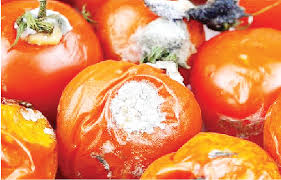
Don’t use rotten tomatoes to prepare food, experts warn Lagos hospital caterers
Amidst the nation's economic crisis, food industry participants have advised caterers working in Lagos General Hospitals not to serve patients meals made with bad ingredients, particularly pepper and tomatoes.
The parties involved issued a warning, stating that using spoilt ingredients may result in food poisoning and other health issues.
Hospital caterers might help avoid foodborne infections and make sure patients receive the nourishing meals they need to recover from illness by adhering to proper food safety and hygiene measures, as they pointed out.
Speaking to caterers from 27 general hospitals and maternal-child centres around the state at a training session sponsored by the Lagos State chapter of the Association of Hospitals Caterers of Nigeria, the participants noticed that patients were already susceptible and were consuming rotten or contaminated food could worsen their situation.
The two-day training programme was part of the association’s efforts to improve the quality of healthcare delivery in the state, particularly in the area of food safety and hygiene.
Food cleanliness in hospitals is crucial, according to Dr. Afolashade Ilori, a lecturer at Olabisi Onabanjo University's Department of Agricultural Extension and Rural Sociology, Faculty of Agricultural Management and Rural Development.
She cautioned that physical or biological contamination could cause patients to experience further health problems.
Participating in the training session as a guest lecturer, Ilori pointed out that eating tainted food could prolong recovery times in addition to making pre-existing conditions worse.
Suggested that hospital caterers choose the highest-quality foods and make sure they are stored correctly to avoid contamination, she emphasised the significance of strict food control operations.
For vegetables in particular, the agriculturist emphasised that meal preparation should include washing and cooking methods that preserve vital nutrients.
"They must ensure that the food they are providing to the patient is extremely pure and safe to eat," she continued. Due to the possibility that any contamination, whether physical or biological, could cause the meal to become polluted and induce an external illness in the patient.
Additionally, this could delay the patient's recovery. In order to maintain food control as a hospital caterer, they must make the best food purchases when they make a buy. And as soon as they buy it, they start getting ready. To keep it from getting infected, they shouldn't leave it where anything or flies could get inside.
"They must realise that the food that the patients are eating is largely to blame for why they were admitted to the hospital. To ensure that patients receive all the nutrients they require for a full recovery, hospital caterers must learn the proper way to prepare some of these dishes.
Ilori suggested that caterers give priority to organically farmed vegetables in view of the current economic challenges, in which many farmers utilise chemicals and fertilisers for faster harvests.
In order to lessen their dependency on tainted and chemically produced food goods, she suggested hospitals to start farming.
As far as we currently know, goods are highly priced in our nation. Aside from that individual, those individuals that are into farming, majority of them want bubble harvest. Some of them, when they plant, will add fertilizer so that the thing can germinate very well. And within two, or three months they begin harvest. All these chemicals they are adding lead to prompt harvest and a bumper and it is not good for consumption.
But when you plant your own, you'll let it develop organically instead of adding any fertilisers or fertiliser. You won't be indirectly consuming chemicals or illnesses by the time it's cooked because all the nutrients will be there. I support hospitals planting because of this.
And now planting is quite simple. Before you plant, you don't need a large plot of land. You can plant in the bag, within the container, and in other locations. Nothing is impossible for you to place inside the sac right now; everything will sprout, but at your own speed. It will be under your observation. No disease outbreak, no infestation of pests, and everything will be okay and it will be safe and healthy for consumption.”
On her part, the chairman of the training committee for the association and also the Head of the Department for Catering service at Ikorodu General Hospital, Mrs. Motunrayo Adewale-Shomope, said there is a need for hospital caterers to ensure that food served to patients is fresh and nutritious.
She emphasised that patients' health, especially those who are recovering, could suffer greatly if they eat spoilt or contaminated food.
Despite the difficulties many of them have getting access to money, she advised against cooking with rotting pepper and tomatoes.
She said hospital caterers have a responsibility to make sure the food they provide patients is wholesome and safe.
She recommended that caterers speak with patients face-to-face to clarify menu items and make sure they are meeting dietary needs related to their particular medical problems.
Speaking to the program's core elements, Adewale-Shomope stated that the training's emphasis on food safety and hygiene was a step towards raising the standard of food provided to hospital patients.
Moreover, the Head of the Catering Department at the Health Service Commission, Tajudeen Gbadamosi, emphasised the need for hospital caterers to prioritise food safety and hygiene in their work.
Before utilising any ingredients, he urged caterers to thoroughly inspect them and to throw away any that were bad or expired.
He emphasised the significance of upholding cleanliness in all aspects of food preparation and storage, including ingredient procurement.
In response to a question on how the state government ensures food safety for hospital caterers, he said, "We start the monitoring from the point of purchases of our food items from various suitable areas, maybe in the minority, maybe anywhere to ensure patients in our hospitals eat healthy food." However, it needs to be quite hygienic wherever you purchase your food.
And after that, you have to drive a clean car to deliver food to the hospitals. We make sure they are maintained at a suitable temperature in the freezer after they get at the hospitals. Thus, these are all components of hygiene.
Food hygiene cannot be guaranteed if food is not kept in refrigerators where it must be preserved and dried food is not kept in a very excellent place where it must be stored. To guarantee food safety, however, we make sure that you adhere to the established protocols at every turn.
Even with cows, we make sure to have visited the abattoir and to be aware of the source of the animal we are buying. Consequently, there are certain regions where they don’t even quarantine the cows and they just kill them. We know where we get our beef, our proteins, and even the chicken, we know where we get them. We don’t get them anywhere. So from there, we ensure that hygiene is being protected.”
In addition, Gbadamosi stated, "The first thing is personal hygiene." Because competent hospital caterers shouldn't wear fingernails. You always have to wear a uniform, and you never wear large earrings.
Proper attire and personal hygiene are essential. Upholding strict hygienic standards is necessary for safe food service even in the face of financial restrictions.
Hospital caterers are competent professionals with specific training in hospitality management and tourism, according to Gbadamosi, who challenged the antiquated notion that this is a low-skilled occupation.
He did point out, though, that the training is a component of the state government's initiatives to raise the standard of healthcare provided in the state.
The speaker underscored the significance of hospital caterers in guaranteeing that patients obtain the necessary nutrients to recuperate from illnesses.
Gbadamosi continued, "The training is a component of the state government's commitment to provide a safe and healthy environment for patients."
He urged hospital caterers to learn from the experience and to use what they learnt in their day-to-day work.
Menu planning, personal cleanliness, and food safety were among the subjects covered in the course. Additionally, food handling, storage, and contamination prevention techniques were taught to the participants.





